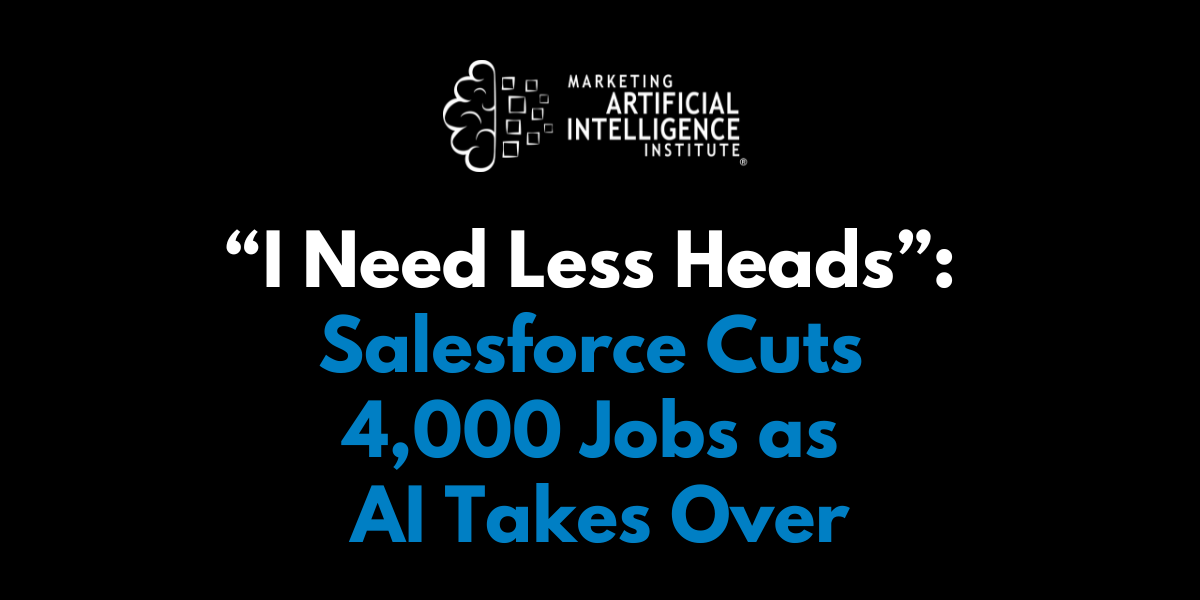Salesforce CEO Marc Benioff has a new directive for his company on AI: Use it, or risk becoming obsolete.
On a recent podcast, Benioff revealed that Salesforce is cutting 4,000 customer support jobs, and he’s not shy about the reason: AI.
The announcement comes after Benioff told The Logan Bartlett Show of the company’s customer support headcount:
“I’ve reduced it from 9,000 heads to about 5,000, because I need less heads.”
He explained that their new AI-powered platform, Agentforce, now handles many of the tasks once done by human support engineers.
To understand how radical this move is and what it means for businesses everywhere, I spoke to SmarterX and Marketing AI Institute founder and CEO Paul Roetzer on Episode 166 of The Artificial Intelligence Show.
The New Math of the AI Era
Benioff's comments represent a new reality for business leaders: AI is now a core part of the workforce. Salesforce views itself as "customer zero" for its new agentic service and support product, meaning it's pioneering the use of this technology within its own company.
The results so far are stunning, according to Benioff on the podcast episode. Over a recent period, Agentforce handled 1.5 million customer conversations, while human agents handled another 1.5 million, with both achieving about the same customer satisfaction scores.
From a business perspective, the logic is clear. If an AI agent can handle tasks at the same or better quality than a human, why would a company not lean on it to reduce costs?
"It's the direction that most of these companies are going to go very soon," Roetzer says. "And I don't think workers are prepared.”
Benioff's comments follow a trend of other executives who are publicly acknowledging the impact of AI on their workforces.
Roetzer mentions examples like EY's Janet Truncale, Vista Equity Partners' Robert F. Smith, and Ford's Jim Farley, all of whom have spoken about AI's ability to either double a company's size without increasing headcount or reduce the need for workers.
The Unspoken Reality: The Job Market is Changing
Benioff's message to his team is that AI is not just a nice to have, it's becoming a key job skill. The same efficiencies Salesforce has seen in customer service are now being applied to sales and marketing. (The company is even using AI agents to call back more than 10,000 leads a week, a task that was once impossible due to a lack of staff.)
Roetzer believes this signals a new era of workforce efficiency. The implicit message, he says, is that as AI proves its worth, the need for human workers in these roles will decrease. This isn't just a Salesforce problem. It's a wake-up call for workers everywhere.
“If you didn’t believe us before, we’ve been saying for a couple years this is where this was going to go. That eventually CEOs would admit out loud this is what’s happening,” he says.
“Because we were hearing it. I was sitting in executive meetings, sitting in boardrooms, and they were telling me point blank this is what they were going to do, but they weren’t saying it publicly yet. And now it’s OK to say it publicly.”
Roetzer’s best advice?
“You have to upskill.”
Why CEO Transparency Is Critical Now
On the leadership side, the most proactive and effective leaders will get ahead of this conversation by communicating transparently with their teams. Roetzer believes every CEO should publish an "AI-forward memo" that outlines their vision for the future of work and their commitment to their employees.
“You have to be able to state ‘Yes, we think we’re going to need fewer people, but here’s what we’re doing about it, here’s what we believe about the future of work, here’s our commitment to you, and here’s what we recommend to you as a worker to make yourself more valuable,’” he says.
This level of transparency can help alleviate the fear and anxiety of existing staff, while also attracting new talent who are looking for companies that are embracing the future.
For companies that ignore this or fail to communicate proactively, it will soon become a competitive disadvantage. As Roetzer explains, talent will gravitate toward companies that are open about their plans and are actively preparing people for the future of work.
He recently shared on LinkedIn a sample outline you can use to write your own AI-forward CEO memo. It’s one of the first, and most necessary, steps to help your organization accelerate AI transformation in a more responsible, human-centered way.
Mike Kaput
Mike Kaput is the Chief Content Officer at SmarterX and a leading voice on the application of AI in business. He is the co-author of Marketing Artificial Intelligence and co-host of The Artificial Intelligence Show podcast.


